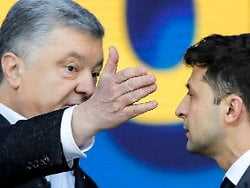Saturday 15 January 2022
Coal, high treason and revenge
Why Poroshenko faces up to 15 years in prison
By Denis Trubetskoy, Kiev
If the Ukrainian ex-president Poroshenko returns to Ukraine on Monday morning, he is threatened with remand. Poroshenko is said to have committed high treason together with a friend of Putin. It’s about coal – and possibly revenge.
On Monday morning at 9 a.m. Kiev time, Petro Poroshenko, the fifth President of Ukraine, is due to return from Warsaw in a WizzAir plane after exactly a month. And although his followers will be waiting for him at Kiev’s Sikorskyj airport, entry will hardly be pleasant for the 56-year-old. Because when Poroshenko left Ukraine on December 17, it probably had something to do not only with planned meetings abroad, but also with the fact that a summons for interrogation was to be handed to him that day.
Since the ex-comedian Volodymyr Zelenskyj beat Poroshenko in the presidential election in spring 2019, the ex-president has appeared in more than 20 investigations. Only one of them, which was about possible influence on the personnel policy of the domestic secret service, had ended up in court by December 2021. For a year and a half, nothing moved in the other proceedings. But now things are getting serious for Poroshenko.
Since December 20, Poroshenko has been accused of high treason and supporting terrorism. According to a court decision, if he lands in Kiev on Monday morning, he would have to be brought to trial, which his supporters probably want to prevent by their presence. Poroshenko faces up to 15 years in prison, and the bail set for the leader of the opposition European Solidarity party is one billion hryvnia – the equivalent of almost $32 million. How he intends to pay the bail is unclear. According to Forbes, Poroshenko’s fortune is a whopping $1.6 billion, making him the seventh richest Ukrainian in 2021. But his accounts were frozen by a court decision for the time being.
Were Poroshenko and Medvechuk in common?
Specifically, the case is about allegedly illegal deliveries of coal from the areas controlled by pro-Russian separatists in the eastern Ukrainian industrial region of Donbass in 2014 and 2015. Since the outbreak of war in spring 2014, the majority of the mines that produce coal for Ukrainian thermal power plants have been in the mines separatist area. From the point of view of the Ukrainian public prosecutor, Poroshenko is said to have deliberately prevented coal imports from South Africa, for example, although the Ukrainian government had been looking for months to diversify the fuel supply due to the complicated political situation.
At a Security Council meeting in November 2014, Poroshenko sharply criticized the purchases and quality of coal from South Africa. Searches followed at the responsible ministry and the dismissal of the energy minister, who according to the investigators was against the purchases from the self-proclaimed people’s republics of Donetsk and Luhansk. Poroshenko replaced him with a new minister, and coal purchases from the “People’s Republics” continued smoothly – until February 2017, when protests by Ukrainian activists, who blocked rail routes to Luhansk and Donetsk for several months, finally ended all trade relations with the separatist areas.
Poroshenko worked on the matter with Viktor Medvechuk, a pro-Russian politician, businessman and close friend of Russian President Vladimir Putin. Medvechuk is currently under house arrest for similar allegations. According to investigators, by cutting off direct coal supplies from Russia in late November 2014, Medvedchuk and Russia’s plan was to leave Ukraine with no choice but to buy coal in the separatist areas. By not using coal from South Africa, Poroshenko is said to have played a key role in this plan.
Evidence is legally questionable
Poroshenko defends himself against the allegations: “That’s crazy. I’m the fifth president of Ukraine. Before you put something like that on the table, you have to provide convincing evidence for both society and international partners,” he says. His lawyer Ilya Novikov explains to the online portal “Ukrainska Pravda”: “Poroshenko then gave the government the task of getting coal. I insist that the government do this completely legally. Because the ban on economic activity with the occupied territories It didn’t come until 2017. The coal from South Africa, on the other hand, was not only not good enough in terms of quality, it was also sold at a significantly inflated price.”
The most important evidence in the proceedings is actually dubious: it is about intercepted telephone calls, but not directly between Poroshenko and Medvedchuk. In addition, they generally have a legally questionable origin. Whether the allegations are sufficient for a conviction is more than uncertain. What is striking, however, is how well the pro-Russian politician Medvedchuk was doing during Poroshenko’s term in office, although he always publicly presented himself as a major opponent of Russia: Medvedchuk built up a media empire of three pro-Russian news channels, all of which were blocked under Zelenskyj. And he officially represented Ukraine in the negotiations in the Donbass war when it came to the exchange of prisoners. Medvedchuk also had to resign from this function under Zelenskyj.
“I’m not your opponent, I’m your judgement,” said future President Zelenskyy during a memorable televised duel with Poroshenko in April 2019 at Kiev’s Olympiyskyi Stadium. For some of the Zelenskyi voters at the time, the current proceedings could therefore be a long-awaited satisfaction. Many of them want the ex-president to be prosecuted. The conflict between Zelenskyj and Poroshenko also has a personal level: During the election campaign, Poroshenko’s team tried, among other things, to defame Zelenskyj as a drug addict. Whether the investigations are an act of revenge and populist action or whether the allegations are well founded will only become clear in the course of the actual proceedings.
